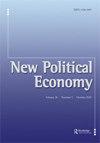科技国家:债务、纪律和加速的新自由主义
IF 3.8
2区 经济学
Q1 ECONOMICS
引用次数: 1
摘要
在这篇探索性的文章中,我们的目标是开启一个研究议程,重新关注资本主义国家与技术生态系统之间的关系。在过去十年中,私营科技公司越来越多地与国家在警务、医疗保健和福利管理等领域的活动纠缠在一起。在国家活动的许多方面都被技术公司及其产品渗透的时候,我们问我们应该如何理论化资本主义国家和技术资本之间的关系?本文开发了一种方法来回答这个问题,通过将技术资本的优先事项与新自由主义国家的优先事项相结合,即通过对相对过剩人口的纪律和管理。在这个舞台上,我们认为,一种形式的技术战已经开始形成:一种技术辅助下的学科逻辑的延伸和强化,这种逻辑将相对过剩的人口锁定在像美国这样的发达资本主义国家的剥削性市场关系和惩罚性制度中。我们通过两种途径探索技术和劳动纪律:消费金融业务与-à-vis债务和信贷工具,以及各种形式的技术支持执法战略。本文章由计算机程序翻译,如有差异,请以英文原文为准。
The techfare state: debt, discipline, and accelerated neoliberalism
ABSTRACT
In this exploratory article, we aim to open a research agenda for renewed attention to the relationship between the capitalist state and the technology ecosystem. Over the last decade, private technology companies have increasingly become enmeshed with the activities of the state in arenas such as policing, healthcare, and welfare administration. At a time when so many facets of state activity are being infiltrated by technology firms and their products, we ask how we should theorise the relationship between the capitalist state and technology capital? This paper develops one approach to answer this question by aligning the priorities of tech capital with those of the neoliberal state namely, through the disciplining and managing of the relative surplus population. In this arena, we argue, a form of techfare has begun to take shape: a technology-assisted extension and intensification of the disciplinary logics that work to lock the relative surplus population into exploitative market relations and punitive institutions in advanced capitalist countries like the United States. We explore techfare and the disciplining of labour through two avenues: the business of consumer finance vis-à-vis debt and credit instruments, and various forms of tech-enabled strategies of law-enforcement.
求助全文
通过发布文献求助,成功后即可免费获取论文全文。
去求助
来源期刊

New Political Economy
Multiple-
CiteScore
10.10
自引率
9.50%
发文量
41
期刊介绍:
New Political Economy aims to create a forum for work which combines the breadth of vision which characterised the classical political economy of the nineteenth century with the analytical advances of twentieth century social science. It seeks to represent the terrain of political economy scholarship across different disciplines, emphasising original and innovative work which explores new approaches and methodologies, and addresses core debates and issues of historical and contemporary relevance.
 求助内容:
求助内容: 应助结果提醒方式:
应助结果提醒方式:


